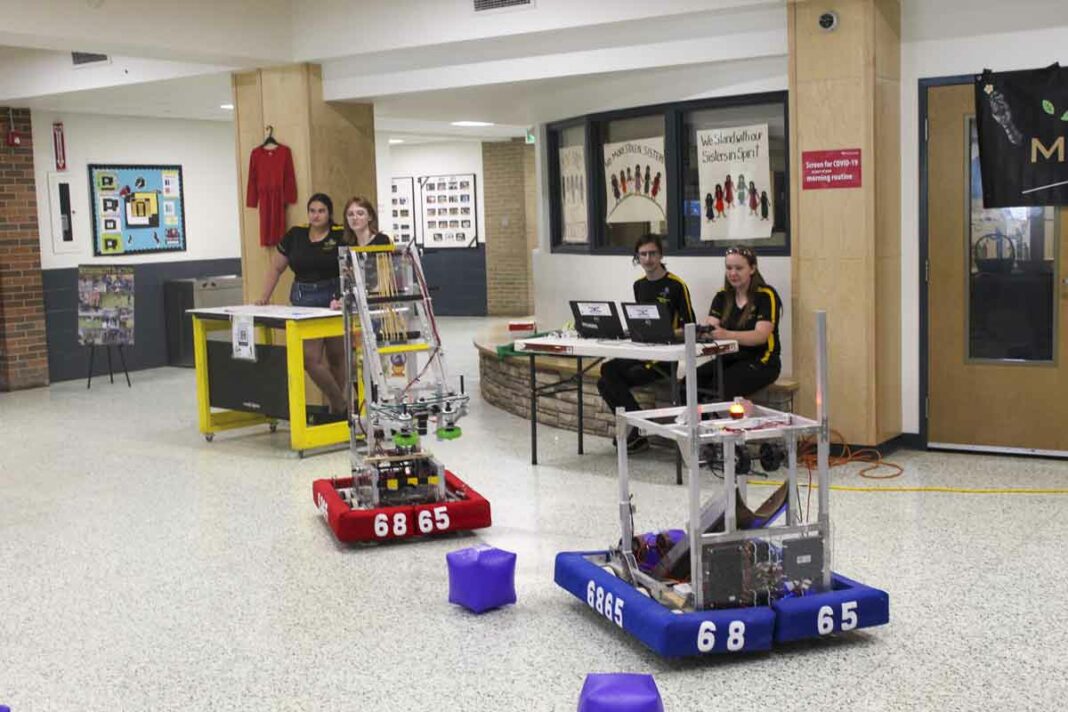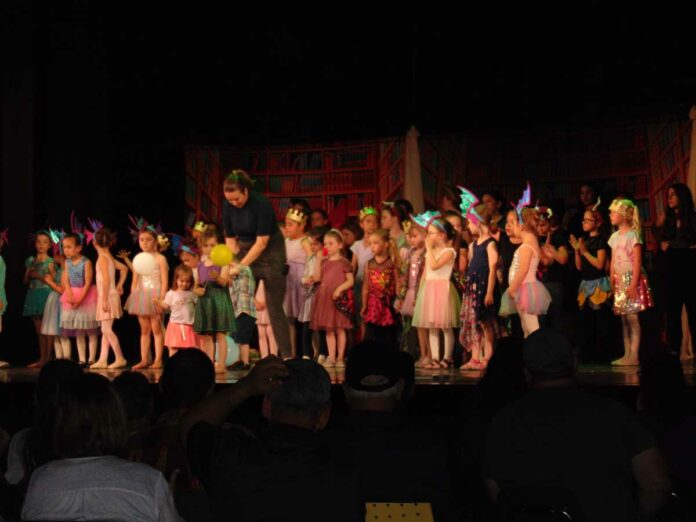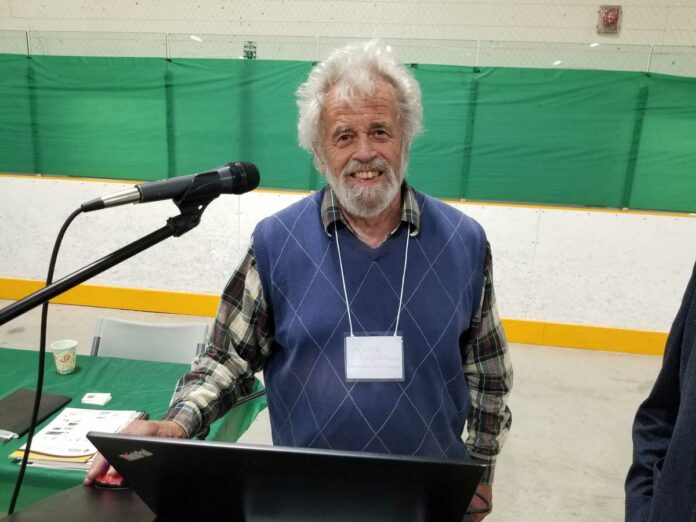M’CHIGEENG—Members of the Manitoulin Metal Robots #6865 team took the opportunity last week to thank the many amazing supporters, donors and sponsors that helped them raise $50,000 for the team to take part in and win a Robotics World Championship FIRST Impact Award in Houston, Texas this spring.
“We are here to show our appreciation for all those who supported the team, showcase and provide highlights of the season, and to hear the FIRST Impact Award finalist presentation,” said Yana Bauer, a mentor of the MSS team at a community appreciation dinner hosted by the team, parents and school last Thursday. The event included the dinner for all supporters, a chance to meet the team and ‘Bumble Bee’ the robot (including a demonstration), interactive activities, presentations and a silent auction.
“We are very proud and humbled by the accomplishments of this team,” said Ms. Bauer. “It was an incredible year, and it is thanks to the team and to all of you who helped support the team. We would not have been able to go anywhere near where we did without all of your support. There was the jaw dropping success in the fundraising campaign, and all the encouragement, love and financial support the team received.”
A special gift was presented to Helen Siksek who along with her husband splits time living in Kagawong in the summer and Dallas, Texas the rest of the year. She was one of the many unsung heroes who helped support the team. She was in Dallas when she read about the MSS team having qualified to compete in Houston at the Worlds in this newspaper, and she sprung into action deciding she had to be travel to Houston, getting in touch with Ms. Bauer and volunteered her support with driving the team back and forth from their hotel to the competition site and back, using her car, running errands, and made a mini-kitchen in her hotel room so she could make sandwiches every night, with snack bags and a water bottle for all members of the team every morning as they participated in the competition.
“Helen was such an amazing supporter of the team,” said Jocelyn Kuntsi, co-captain of the MSS team. “We all love Helen.”
Members of the team got up on the MSS stage and introduced themselves before talking about and showing by way of video and photographs their journey through the first competition of the season in North Bay, the McMaster University Robotics championship, the provincials also held in Hamilton and the World Championship.
Three students, Alex Wilson-Zegil, a Grade 10 student, Grade 9 student Addy Gray and Grade 12 student Jocelyn Kuntsi then presented the Impact Award speech that helped the team win the First Impact Award Finalist award.
“Picture this, we’re driving down the windy road to Sheshegwaning, a small First Nation on Manitoulin Island. Surrounded by thick, green tress, 20 kilometres of the same thing. Two roads diverged in the woods, and that’s when our bus driver turns around and asks us, ‘does anyone know which way we go?’”
“Did you know you can download maps to use offline? Yeah, we did not do that,” the students said. “Someone from the back said go left, so we did. Twenty nail-biting minutes later, we arrived at St. Joseph’s Anishinaabek Elementary School. We were greeted by a gym full of excited students, and an ever more excited principal who later explained that they rarely get presenters because of their remote location.”
“Despite the road bump, we made it. You know, we definitely could have used a map. As a team, we have lots of goals to work towards. Sometimes it’s small, like driving to an elementary school, but usually bigger, like designing our own robot, or leading the global FIRST community to take more environmental action.”
“It can be hard to find where to start,” the students said. “We needed some sort of guide to more efficiently reach our destination. Now, we are excited to share with you our roadmap for the future.”
The students noted the roadmap consists of community, action and outreach. “Each curated landmark has a purpose into building a sustainable and inclusive community. FRC 6865 was founded in 2018 by eight students and two mentors.”
“Our team now includes 22 students, (10 female, 12 male) and four dynamic mentors,” the students said. “We are aided by our generous community sponsors and our growing alumni network. And we are grateful for the help of teams like 5672, 1325 and 4039.”
“However, our heart comes from our community on Manitoulin Island,” stated the students. “After qualifying for worlds, we realized we had to fundraise over $50,000 dollars in under a week, in a community of less than 15,000 people. Over the past few days, we have been experiencing the most beautiful and humbling example of the pride in our team.”
“We are here today because over 230 community members and local businesses believed in our team. We are proud to say we have achieved 100 percent community engagement,” the students continued. We are so grateful to have so many rooting for us as we help pave the way for science, technology, engineering, mathematics (STEM) on Manitoulin.”
The students explained, “when we go to competition, we are often known as the ‘green team.’ And its not because of our team colours. Living in such an environmentally rich area, each team member holds a strong sense of responsibility to sustainability.”
“We have started many initiatives that produce measurable results through sustainable action, from collecting more than 20,000 dead batteries, to planting over 100 trees, to cleaning up over 50 bags of shoreline waste and holding three annual e-waste drives. We even help take care of over 200,000 bees in the school apiary.”
“In the FIRST community, we have worked with other teams with the carbon calculator we created to promote carbon neutrality among FIRST,” the students continued. “We take FIRST traditions like buttons and shirts and offset the carbon cost. Integrating environmental action has to be considered in all aspects of our team. It is a priority to embed green practice in the engineering of our robot. Practices like using recycled metal for machine parts or sourcing local materials.”
“This year we fundraised to purchase 21 tonnes of carbon offsets, covering our entire carbon footprint. Lots of this was done through team fundraising. But we really felt our impact when a local business offered to sponsor our carbon offsets for the world championships; providing that our green lens goes beyond our team.”
“Our map takes us from place to place where we both teach and learn,” the presenters said. “Over the past few years, we have started several new traditions. First, is working more hands on with elementary schools to inspire new demographics. Manitoulin youth are often faced with a lack of opportunity due to being in widespread remote communities.”
“This roadblock exists especially within the STEM field,” they said. “After competition season last May, we took action and visited all six elementary schools on Manitoulin to teach about robotics. This included running presentations to over 1,000 students across 121 kilometres. We had students try many activities from designing buttons, to building with Lego kits, to FTC races, to driving our competition robot.”
“Almost 30 percent of our team this year comes from grade nines who attended those presentations.” Addy said, “I was one of those students last year and it helped widen my perspective in STEM.”
“Our coding team also worked with FIRST Canada to do CanCode sessions in four different elementary schools,” said the students. “Exposing Manitoulin’s youth to STEM is a great opportunity for kids to explore their interests without feeling restricted by our location.” The team has also expanded its outreach on social media to include TikTok, receiving over 10,000 views on several of our posts.”
“One of our biggest initiatives was the launch of our environmental STEM conference. We invited both our Manitoulin community and the entire FIRST community. It included a sunrise ceremony, a keynote on Indigenous practice and environmental sustainability, tree planting, a design challenge, and a group discussion.”
The students said, “We are well known for our community leadership. From speaking with over 300 community members at our Providence Bay Fair booth, to running school spirit events with our robots, to volunteering at the community Christmas craft fair.”
“Even though our actions are local, the impact is global. It’s hard to name one destination, which is why we are using a map to connect the many goals in our communities with each other. We have been working on that connection through action. Producing this dynamic map to the future to continue growing as a team as individuals and in innovation to help STEM across Northern Ontario, reaching communities like Sheshegwaning and beyond. And to lead FIRST toward a sustainable future so that all teams are known as ‘green teams’.”





